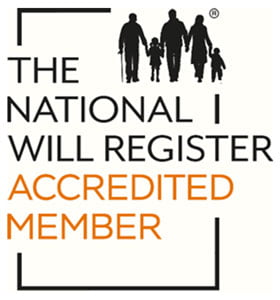The New Year’s resolution you can stick to…
Exercise more? Cut out alcohol? Make a Will?
Good intentions come in all shapes and sizes. And a new year presents that perfect opportunity to make changes, to improve, to get things done. It feels like a time to start afresh, with a positive attitude and a determination to shake off the old.
That’s the theory, anyway. (How many of us have made resolutions, only to fall at the first hurdle?) But the experts say it’s all about setting achievable goals. It’s about pinpointing what needs to be done, what can be achieved and committing to doing it.
As a legal expert who helps people get their personal affairs in order, clients sometimes come to me in January with one question: I need to get myself organised, but I have no idea where to start. My response? Let’s talk about your situation.
Personal circumstances dictate what measures should be put in place, how and when. Some clients will have particular concerns – how to ensure the right people will benefit from their estate, how to minimise tax, how to earmark money for care home fees, for example – and we’ll talk through the best ways of achieving those aims. There may be things clients haven’t considered – a discretionary trust or a living Will, for instance. And there will be clients who know what they need and simply want us to get the paperwork in place. The key thing in each of those scenarios is understanding the full picture, so that the future planning fits together cohesively.
This all has to start somewhere. And my message for now is: use January to get the basics done. A Will and a Lasting Power of Attorney are two documents that can be put in place relatively quickly and they offer peace of mind that aspects of your future, and that of your family, are taken care of.
Why a Will?
Everyone should have one. It is the legal assurance that your estate will be dealt with in the way you want after you have passed away. It can be used to express certain wishes and it means your family will avoid being subject to the rules of intestacy which add complexity to the estate management process and could mean significant people in your life don’t inherit. It’s even more important to have a Will if you and your partner are not married or in a civil partnership, as the law offers less protection to cohabitees – you may not inherit your family home in the event your partner dies, for example.
Making a Will gives peace of mind, but it’s not something you should forget about once it’s been written and filed away. It’s really important to check in on your Will every three to five years and always when aspects of your life change – a new baby, you receive some inheritance, your executor passes away, you marry. If you need to make a change, your solicitor will be able to advise you on whether to prepare an entirely new Will, or whether the change can simply be made via a ‘codicil’ – a formal alteration.
Why a Lasting Power of Attorney?
These are usually very straightforward to put in place, and there can be huge advantages to having one. A Lasting Power of Attorney appoints people to make certain decisions about your property and finances or your health and welfare if you become unable to make those decisions for yourself. It’s a bit like an insurance policy; you might not need to call on it, but it’s there if you do. None of us knows if an accident or an illness might rob us of our mental capacity, leaving us unable to take proper care of ourselves. A Lasting Power of Attorney means the right people are ready to step in if called upon.
As with Wills and other future planning documents, it’s important to update your Lasting Power of Attorney if relevant change happens in your life. You might need to appoint an additional attorney, or replace one who can no longer carry out the role. You may want to change an instruction or preference you’ve set out. Making sure the Lasting Power of Attorney keeps apace with developments means you’ll have a document that offers you the best protection.
Of course, there are many other aspects of future planning that can be put in place relatively quickly and which will reassure you and your family for the years ahead. The most important thing to do is: something. Taking steps now to get plans in place will place one, giant tick on your to-do list. And speaking with a Wills and inheritance specialist is a great place to start. They’ll help you map out a plan and get those vital legal and financial provisions in place.
For advice about making a Will or a Lasting Power of Attorney, or any other aspect of future planning, contact Emma Howlett or a member of the Private Client team on 0808 256 2917.






